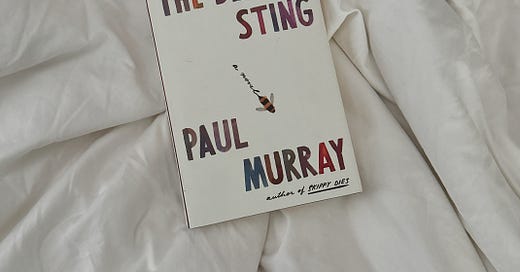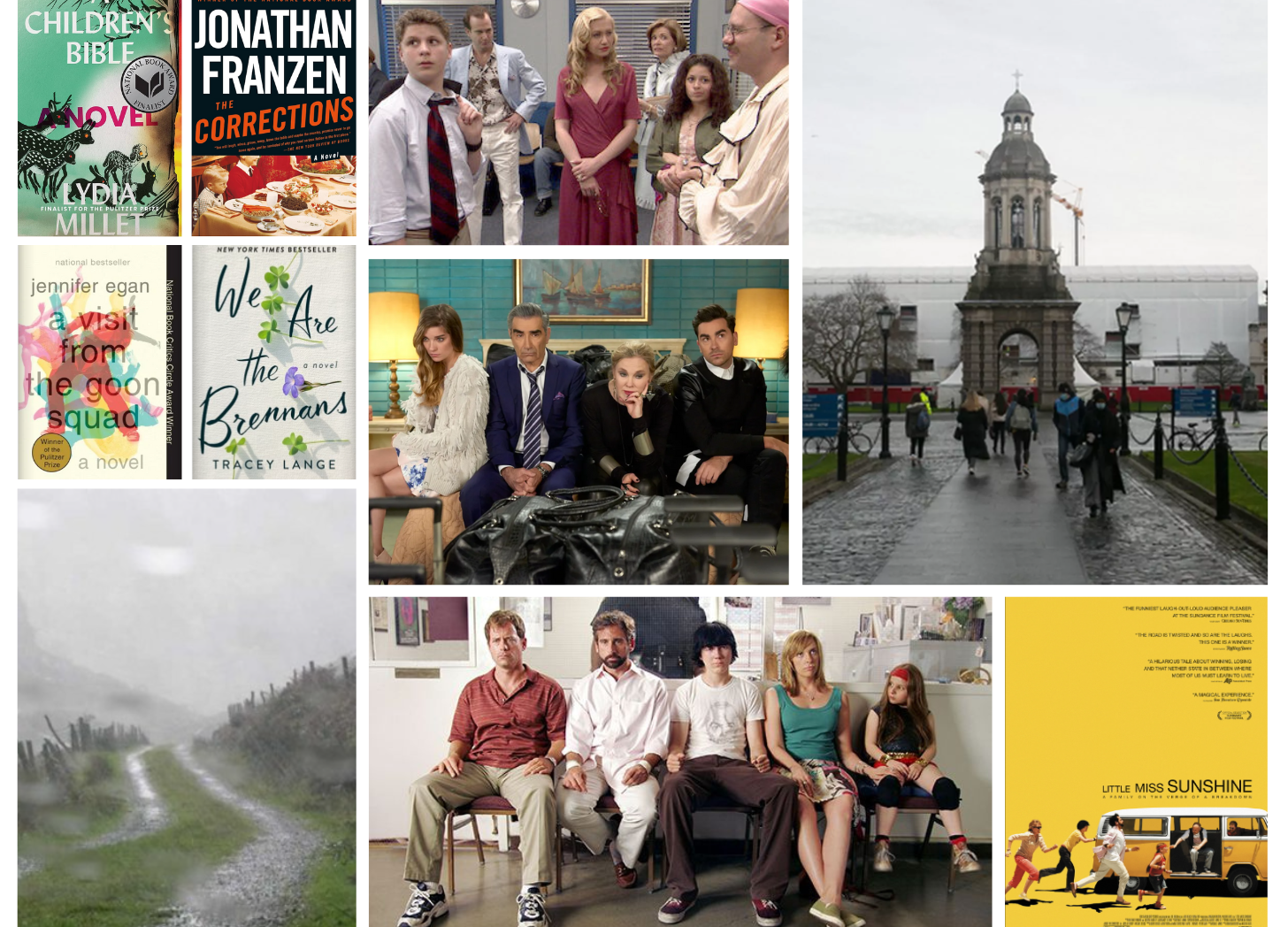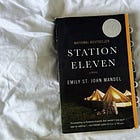The tragic comedy of The Bee Sting
why Paul Murray is the best of the Booker Pauls [thus far].
To all my wonderful subscribers: The time has come. After today, book essays will be paywalled*. The weekly Curator will continue to be free to all. Please enjoy this last free book essay on me and consider upgrading your subscription to read future essays.
*If you are a student or otherwise financially compromised, please message or email me and I will comp you no questions asked. If you are a book or culture Substack writer and would like to trade subscriptions, message or email as well. Cheers friends 🖤
It can feel impossible to put into words what makes a novel extraordinary. Not just good, but the kind that comes with a tingly feeling. The kind where each sentence creates a magical projection on the inside of your head of fully fleshed characters and sets. Where the prose is so compelling, it makes you simultaneously want to write and also know you will never write like that. The feeling is similar to watching a superstar perform - they just *have* it. The Bee Sting by Paul Murray is that for me.
If Murray asked me to blurb his book, this is what I would write:
An Irish family saga about what happens when everything falls apart and everyone else is too self-absorbed to care. A lava flow of humanity wrapped in brilliant prose and innovative form, contained only by misguided love and self-acceptance. A masterful examination of the ways in which we lie to each other and ourselves and the consequences of our deception.
In this novel, everyone is pretending. Pretending to be someone they aren’t, hiding parts of themselves, or lying by omission. The novel suggests that, like the moon, we are only partially exposed at any given time, a fractured picture of self, unknowable even to ourselves. Murray explores what happens to our relationships when we are dishonest and the ways in which secrets - and shame - break us.
Murray also explores themes of death - literal death, but also of innocence, of spirit, of love, of society, and of the earth. Death bookends the novel (not necessarily for any specific characters; I won't spoil anything), and in between, he explores what it takes to survive - the end of the world or the end of just your world.
It’s also very funny, a black comedy that allows us to suspend our disbelief at points about the almost cosmic alignment of events that push the plot along. The minutiae of everyday life in small-town Ireland are punctuated with big feelings of desperation and disaster that could have been avoided if only people had been honest or if anybody had bothered to pay attention. We wonder, is this where it all started to go wrong?
And he does all of this in the most interesting way, stylistically. I am not particularly swayed by overly descriptive, romantic language. I like my themes and lessons buried under the everyday drama. I am drawn to risky form and voicey narrators. I am learning to broaden my tastes, but when I come across a novel such as The Bee Sting, I feel right at home.
form = function
The first 75% of the book is four large chapters, one dedicated to each family member’s POV. Our cast includes daughter Cass, all 17-year-old sass and emotions, poised on the precipice of freedom with no idea how to handle it; son PJ, the purest 13-year-old boy on the planet who takes the suffering of his family as seriously as he takes his video games; mother Imelda, who is bold, relentless, and self-absorbed in the face of past trauma; and father Dickie, a big derp of a man who seems to have never made a good decision in his life. We slowly build into the center, the heart of the story, as the family struggles to survive the financial crash of 2008. Once a well-to-do family, their fall is even more drastic, shaking out all the shame and shortcomings for the small town to witness. Every character has a competing perspective on the same events, and somehow, Murray makes us sympathetic to them all.
Then we get fast chapters with rapid POV changes, switching into second-person subjective. We go deeper and become the characters, ratcheting up the tension as we build to an unknown climax - there is no natural peak to this plot; we don’t know what’s coming, but we know it’s something.
The last few pages are increasingly short jumps between characters, building to a crescendo, a comedy of errors visually like a play on the page. Everything converges. This is it - will it pay off?
At each transition, we think we know the family members, and each new perspective shows us the other side, the missing motivations. Truly, each person is their own main character, with a strikingly shallow understanding of their supporting cast.
Can you ever truly know someone else? Even your blood, your family?
Even someone you have carried inside you?
the voice
Each character is so uniquely themselves. Writing four distinct characters is a feat of imagination and skill. Cass is my least favorite, which can make the story hard to get into right away, but it feels true to life - you could not pay me to be a teenage girl every again. Still, we feel all the feelings each POV has to offer.
For example, this brilliant passage about being unable to understand the tenor of a new culture:
the prose
Murray writes long sentences that are like your mouth filling up with water and then a full stop at the swallow. Many lessons are hidden in those stop moments. And it goes down hard.
He also takes style risks. Imelda’s section lacks almost all punctuation, which brings us into this exhausting, ditzy stream of consciousness that becomes, dare I say, endearing by the end. Imelda is shrill and unforgiving when we are in Cass’ head. Now, we might even like her, mostly because she’s funny (never underestimate funny!).
Take this family moment, narrated by Imelda. Things have already been falling apart for quite some time by this point.
the message
I get angry at books that are too preachy or too on the nose or don’t seem to trust their readers to understand the subtext. Murray does something smart - he brings in an orator, the conscience of the text but within the frame of argument for argument’s sake. The orator himself is prepared to argue either side - then why do we feel so called out?
The Verdict👩⚖️: One of the best reading experiences of my life thus far. It will take a miracle for another book to knock The Bee Sting out of top billing for 2024.
The Vibe✌️: Your favorite messy family but in a gloomy, rainy, wild Ireland
Have you read The Bee Sting? If you have any thoughts, leave them in the comments.
The Reviews 💻→
The Bee Sting by Paul Murray, reviewed by Stephen Cox for The Stinging Fly Magazine
NYT Book Review: A Rollicking Tragicomic Tale of Unending Family Drama
Slate Book Review: A Novel That Strives to Engage the World on Every Single Page
In Case You Missed It 🖤
This newsletter contains affiliate links. If you purchase using one of the links above, I will earn a baby-sized commission at no cost to you. Comment, share, repost, upgrade to paid, or buy me a coffee to support my work. Follow me @ thebookcreep on Instagram for pretty book pictures. Your support (monetary or not) is why I keep going, so thank you.
See you around the bookshelf!















Wonderfully written review. So honest and insightful. Has to be my next read.
"One of the best reading experiences of my life thus far." WOW!!! High praise!!! It's on my TBR because of you. It sounds like a great time. Ireland, the book /writer gift that keeps on giving.
Congratulations on going paid!!! 🥳 Proud of you!